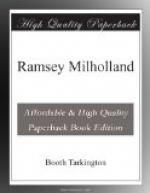She lifted a wet face. “No, no! He went in bitterness because I told him to, in my own bitterness! I’ve killed him! Long ago, when he wasn’t much more than a child, I heard he’d said that some day he’d ‘show’ me, and now he’s done it!”
Fred whistled low and long when she had disappeared. “Girls!” he murmured to himself. “Some girls, anyhow—they will be girls! You can’t tell ’em what’s what, and you can’t change ’em, either!”
Then, as more urgent matters again occupied his attention, he went on at an ardent and lively gait to attend his class in map-making.
Chapter XXI
That thunder in the soil, at first too deep within it to be audible, had come to the surface now and gradually became heard as the thunder of a million feet upon the training grounds. The bugles rang sharper; the drums and fifes of town and village and countryside were the drums and fifes of a war that came closer and closer to every hearth between the two oceans.
All the old symbols became symbols bright and new, as if no one had ever seen them before. “America” was like a new word, and the song “America” was like a new song. All the dusty blatancies of orating candidates, seeking to rouse bored auditors with “the old flag”; all the mechanical patriotics of school and church and club; all these time-worn flaccid things leaped suddenly into living colour. The flag became brilliant and strange to see—strange with a meaning that seemed new, a meaning long known, yet never known till now.
And so hearts that thought they knew themselves came upon ambushes of emotion and hidden indwellings of spirit not guessed before. Dora Yocum, listening to the “Star Spangled Banner,” sung by children of immigrants to an out-of-tune old piano in a mission clubroom, in Chicago, found herself crying with a soul-shaking heartiness in a way different from other ways that she had cried. Among the many things she thought of then was this: That the banner the children were singing about was in danger. The great country, almost a continent, had always seemed so untouchable, so safe and sure; she had never been able to conceive of a hostile power mighty enough to shake or even jar it. And since so great and fundamental a thing could not be injured, a war for its defence had appeared to be, in her eyes, not only wicked but ridiculous. At last, less and less vaguely, she had come to comprehend something of the colossal German threat, and the shadow that touched this bright banner of which the immigrants’ children piped so briskly in the mission club-room.
She had begun to understand, though she could not have told just why, or how, or at what moment understanding reached her. She began to understand that her country, threatened to the life, had flung its line those thousands of miles across the sea to stand and hold Hindenburg and Ludendorff and all their Kaisers, Kings, Dukes, and Crown Princes, their Krupp and Skoda monstrous engines, and their monstrous other engines of men made into armies. Through the long haze of misted sea-miles and the smoke of land-miles she perceived that brown line of ours, and knew it stood there that Freedom, and the Nation itself, might not perish from the earth.




